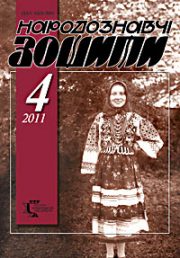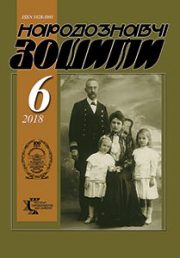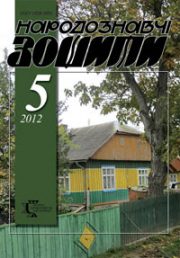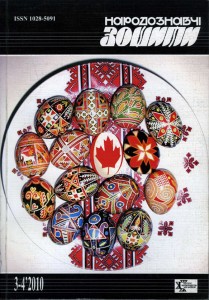2010 year, issue 3-4
Pavluk Stepan. On Ukrainifns’ Popular Traditionalism in Canada. P. 290-292
read »
Hornjatkevych Andrij, Mayerchyk Maria. The Characteristics of Ukrainian Folklore Studies in Canada. P. 293-309
read »
Kucharenko Svitlana. A Short Overview of the North American Folkloristics: Theories, Approaches, and Paradigms. P. 310-315
read »
Nahachewsky Andriy. Shifting Orientations in Dance Revivals: From “National” to “Spectacular” in Ukrainian Canadian Dance. P. 316-324
read »
Rees Vincent. Bereznianka: Becoming Symbolic. P. 325-331
read »
Cherwick Brian. “This land is your land…”: Two Tendencies in Ukrainian-Canadian Music. P. 332-339
read »
Hornjatkevych Andrij. Kobza, bandura, kobza-bandura, “kobza” and (again) kobza. P. 340-347
read »
Khanenko-Friesen. Natalia Making Ukrainian House Calls: On Diasporic Tourism and Rituals of Homecoming. P. 348-362
read »
Lesiv Mariya. “Glory to Dazhboh”: The Ukrai¬nian Native Faith Movement as an Alternative Vision of Nation. P. 363-370
read »
Kukharenko Svitlana. Roadside Memorials: A Contemporary Phenomenon or Continuity of the Folk Traditions. P. 371-377
read »
Foty Nadya. Ukrainian Mock Weddings in Saskatchewan: Folk Burlesque. P. 378-383
read »
Kononenko Natalie. How God Paired Men and Women: Religious Stories and Religious Revival in Post-Soviet Ukraine. P. 384-392
read »
Swyripa Frances. Negotiating Sex and Gender in the Ukrainian Bloc Settlement: East-Central Alberta Between the Wars. P. 393-406
read »
Swyripa Frances. Gender Relations, Peasant Priorities, and Moral Values in the Ukrainian Village in Eastern Galicia, 1900-1944. P. 407-417
read »
Mayerchyk Maria. Scenarios of Gender Success and Structure of Gender Power among Ukrainian Farmers in West Canada before 1939. P. 418-430
read »
Hrymych Maryna. Using Dumy to Study the So¬ciology of Ukrainian Immigration of ХVІ-ХVІІ sent. P. 431-437
read »
Lutsko Oksana. Motifs and Poetics of Ukrainian Folk Songs About Emigration to Canada. P. 438-447
read »
Medwidsky Bohdan. A Ukrainian Assassination Ballad in Canada. P. 448-453
read »
Nahachewsky Andriy. Searching for Branches, Searching for Roots: Fieldwork in my Grandfather’s Village. P. 454-459
read »
Klymasz Robert B. Cultural Maintenance and the Ukrainian Experience in Western Canada. P. 460-465
read »
Medwidsky Bohdan. Popular Culture and Folk Culture: Where They Do or Do Not Intertwine. P. 466-473
read »
Klymasz Robert B., Medwidsky Bohdan. Contem¬porary Expressions of Traditional Slavic Culture in North America. P. 474-476
read »
Balan Jaroslaw. “To Canada”: Michael Gowda’s Unique Contribution to the Literary History of Alberta. P. 477-484
read »
Goa David J. Three Urban Parishes: a Study of Sacred Space. P. 485-496
read »
Klymash, Robert B. Soviet Views of American Folklore and Folkloristics (1950-1974). P. 497-502
read »








